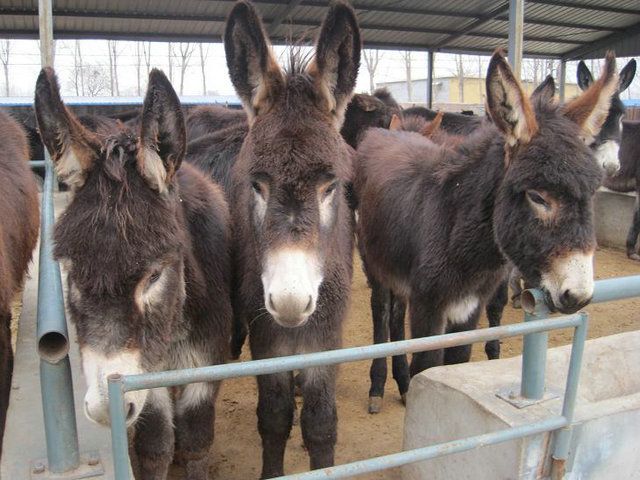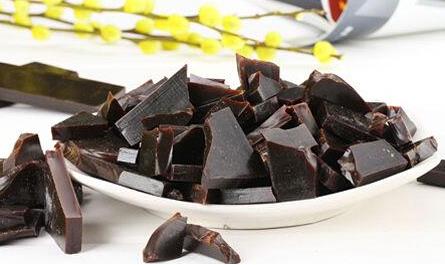


(File photo)
When it comes to overseas consumption by Chinese buyers, Louis Vuitton is not the only popular "LV." The LV abbreviation spells "donkey" in pinyin, and Chinese consumers are increasingly interested in real donkeys as well as LV bags.
Donkeys imported from overseas already account for some 20 percent of the total products at Dong’e E jiao, one of the largest companies dealing E Jiao, or donkey-hide gelatin, according to the company’s president Qin Yufeng.
Meanwhile, the number of donkeys imported from Nepal to China saw a great increase in 2016, already close to 80,000 before the year's end. At the same time, in Burkina Faso, some 45,000 donkeys were slaughtered within six months, Guancha.cn reported.
China needs about 4 million donkeys each year to satisfy market demand, as the nation’s annual E Jiao production is estimated at more than 5,000 tons. However, the actual supply is only around 1.8 million, the Xinhua News Agency reported.
E Jiao is gelatin obtained from donkey skin through a process of soaking and stewing. It is often used in Chinese medicines to treat bleeding, dizziness, insomnia and coughing.

(File photo of E Jiao)
For Dong’e E Jiao alone, the company needs over 1 million donkey skins every year, but the supply always falls short, the company’s managers admitted in an interview with Beijing Youth Daily.
“We began to see in 2000 that the drop in donkeys would affect our operation one day. We therefore set up 20 donkey farms in China, but even so we cannot guarantee a sufficient supply,” said Zhang Xiaoyang, general manager of a Dong’e E Jiao affiliate.
National data on livestock shows a sharp drop of donkey numbers in China. They have declined to about 5 million from 11 million in the 1990s. The number is still declining at a rate of over 3 percent, according to Beijing Youth Daily.
The use of modern farming machines have left donkeys without a job in rural areas, and the previously low demand for E Jiao and donkey meat convinced many farmers to quit raising the animal, the article added.
“It is increasingly hard to find employees from the acquisitions department, because they spend more and more time looking for donkeys across China. The difficulties have been mounting, as the number of donkey drops every year. It requires trips to several areas to meet the company demand,” an anonymous employee with the company was quoted as saying.
This shortage has also led to a price hike for E Jiao in China. The latest increase, which marked the 16th in the past decade, brought pure donkey-hide gelatin to 10,000 RMB per kilogram, Beijing Youth Daily noted.
 Fire brigade in Shanghai holds group wedding
Fire brigade in Shanghai holds group wedding Tourists enjoy ice sculptures in Datan Town, north China
Tourists enjoy ice sculptures in Datan Town, north China Sunset scenery of Dayan Pagoda in Xi'an
Sunset scenery of Dayan Pagoda in Xi'an Tourists have fun at scenic spot in Nanlong Town, NW China
Tourists have fun at scenic spot in Nanlong Town, NW China Harbin attracts tourists by making best use of ice in winter
Harbin attracts tourists by making best use of ice in winter In pics: FIS Alpine Ski Women's World Cup Slalom
In pics: FIS Alpine Ski Women's World Cup Slalom Black-necked cranes rest at reservoir in Lhunzhub County, Lhasa
Black-necked cranes rest at reservoir in Lhunzhub County, Lhasa China's FAST telescope will be available to foreign scientists in April
China's FAST telescope will be available to foreign scientists in April "She power" plays indispensable role in poverty alleviation
"She power" plays indispensable role in poverty alleviation Top 10 world news events of People's Daily in 2020
Top 10 world news events of People's Daily in 2020 Top 10 China news events of People's Daily in 2020
Top 10 China news events of People's Daily in 2020 Top 10 media buzzwords of 2020
Top 10 media buzzwords of 2020 Year-ender:10 major tourism stories of 2020
Year-ender:10 major tourism stories of 2020 No interference in Venezuelan issues
No interference in Venezuelan issues
 Biz prepares for trade spat
Biz prepares for trade spat
 Broadcasting Continent
Broadcasting Continent Australia wins Chinese CEOs as US loses
Australia wins Chinese CEOs as US loses